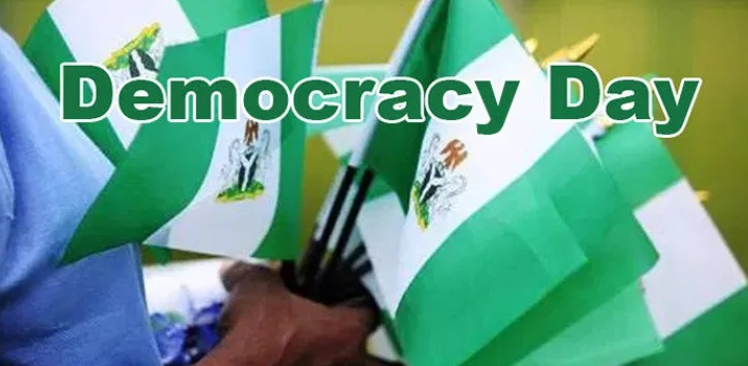“Nigeria’s Democracy at 25: Tinubu’s Leadership Lays Foundation for Greater Heights”
As Nigeria observes Democracy Day on June 12, the nation celebrates a remarkable milestone—25 uninterrupted years of civilian governance. This quarter-century of democracy is the longest in Nigeria’s history, signifying resilience and progress in its political journey. While challenges remain, President Bola Ahmed Tinubu’s administration is charting a path toward national transformation, prioritizing reforms aimed at long-term stability and sustainable development.
Democracy, though globally celebrated as the best system of governance, comes with growing pains. In Nigeria, its journey has been a mix of triumphs and trials. While citizens have voiced concerns about governance and economic realities, many also recognize the foundations being laid for a more inclusive and prosperous future.
The Strides of Tinubu’s Administration
President Tinubu assumed office at a critical time, inheriting systemic issues and an economy under strain. Despite these challenges, his administration has taken bold steps to address foundational problems that have plagued the country for decades. From economic reforms to democratic strengthening, Tinubu’s leadership reflects a commitment to resetting Nigeria on the path to growth.
One notable achievement is the removal of the fuel subsidy, a long-overdue reform that, while initially painful, is projected to free up significant resources for infrastructure, education, and healthcare. This decision demonstrates Tinubu’s resolve to prioritize fiscal discipline over short-term populism.
In addition, the upward review of the minimum wage for corps members from ₦33,000 to ₦77,000 reflects the administration’s understanding of the economic pressures facing young Nigerians. Tabitha Onah, a corps member in Abuja, acknowledged this step as a relief, even as she called for further measures to address the rising cost of living.
“The new ₦77,000 feels like a relief. It shows that the government is listening to us,” she said.
Building Inclusive Governance
Tinubu’s administration has also shown a commitment to strengthening democratic institutions and fostering inclusion. Efforts to grant local government autonomy have been widely lauded as a critical step in bringing governance closer to the people. Balarabe Sule, a Kano resident, described this move as monumental:
“Giving local governments autonomy is a huge achievement for democracy. It ensures grassroots development and empowers communities to take charge of their progress.”
While some have raised concerns about representation in political appointments, the administration’s focus on competence and merit aims to create a government that delivers results for all Nigerians, regardless of ethnicity or background.
Reforms for Sustainable Progress
Economic reforms under Tinubu’s leadership have sparked debates, but many see them as necessary for Nigeria’s long-term prosperity. Dr. Kabiru Danladi Lawanti, a political analyst, emphasized that while the removal of the fuel subsidy has caused short-term hardship, it was a strategic move to address systemic inefficiencies.
“The subsidy removal is a bold reform. It’s painful now, but it’s a necessary step to redirect resources toward critical sectors like infrastructure, education, and healthcare,” he said.
The administration is also working to stabilize inflation and create an enabling environment for small businesses. By prioritizing fiscal discipline and seeking foreign investments, the government aims to build an economy that works for all Nigerians.
A Renewed Commitment to Security and Transparency
In the area of security, Tinubu’s government is adopting a people-centered approach to address the root causes of conflict and insecurity. Recent efforts to revamp the nation’s security architecture reflect a commitment to protecting citizens and restoring peace across troubled regions.
Transparency and accountability remain high on the agenda. Civil society organizations, including the Civil Society Legislative Advocacy Centre (CISLAC), have acknowledged the administration’s efforts to address corruption and ensure that public funds are used effectively.
“The government is taking steps to restore public trust by prioritizing transparency and accountability in governance,” said Auwal Musa Rafsanjani, CISLAC’s Executive Director.
Democracy as a Work in Progress
While challenges persist, many Nigerians understand that democracy is a journey, not a destination. Jeremiah Yibowei, a web developer, described democracy in Nigeria as a “work in progress” and expressed optimism about the nation’s future.
“Democracy in Nigeria is a test of resilience. It’s not perfect, but we’re moving in the right direction,” he said.
Similarly, Amina Maikasuwa, a student and tailor, called for greater inclusion of women and small business owners in policymaking, emphasizing the need for leaders to listen to the voices of ordinary Nigerians.
“If democracy is truly for the people, then our needs should matter,” she said. “But I believe we’re making progress.”
The Path Ahead: Unity and Collaboration
As Nigeria reflects on 25 years of democracy, the focus is now on sustaining its gains and addressing its challenges. President Tinubu’s administration has demonstrated a willingness to take difficult but necessary decisions, reflecting a leadership style that prioritizes long-term benefits over short-term popularity.
Pro-democracy activist Femi Aborishade highlighted the need for citizens and leaders to work together to strengthen democratic institutions and ensure that governance aligns with the aspirations of the people.
“This administration has taken bold steps. What’s needed now is collaboration between the government and citizens to build a democratic system that delivers,” he said.
Conclusion: Tinubu’s Vision for a Greater Nigeria
As the nation celebrates 25 years of uninterrupted democracy, there is much to be hopeful for. President Tinubu’s administration is laying the groundwork for transformative change, addressing systemic issues, and fostering a culture of accountability and inclusiveness.
Nigeria’s democracy is a testament to the resilience of its people. With bold reforms, a focus on grassroots development, and a commitment to uniting the nation, Tinubu’s leadership is positioning Nigeria for greater heights. Though challenges remain, the journey toward a stronger, more prosperous democracy is well underway.
The next chapter of Nigeria’s democratic story holds the promise of a brighter, more inclusive future—one where every citizen can thrive.


